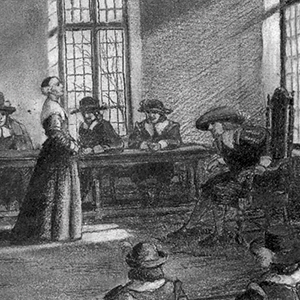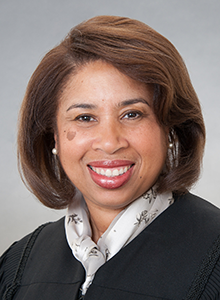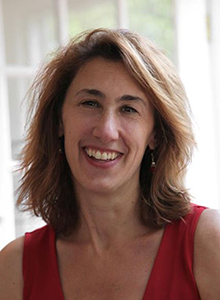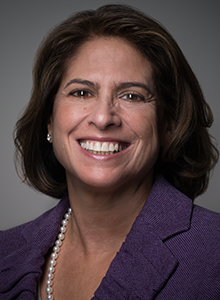Meet the 2020 Margaret Brent Award honorees

Image of Margaret Brent courtesy of Maryland State Archives
Updated: Despite the distance between them, an appellate judge from Washington, D.C., and four attorneys from around the country came together virtually Thursday to receive the 2020 Margaret Brent Women Lawyers of Achievement Awards.
ABA President Patricia Lee Refo highlighted the significance of celebrating the honorees’ achievements amid this year’s commemoration of the centennial of the passage of the 19th Amendment, which gave many women the right to vote.
“The incomparable women we honor today—Ruthe Catolico Ashley, the Honorable Anna Blackburne-Rigsby, professor Deborah Epstein, Wendi Lazar and Regina Montoya—are the latest role models for our profession to celebrate,” Refo said. “Much like the women of 100 years ago, who fought for women’s suffrage, you are each trailblazers and have led the profession by your example. You represent the very best of us.”
The ABA Commission on Women in the Profession established the annual awards in 1991 to celebrate female lawyers for their professional accomplishments and support of other women in the legal profession.
The awards are given in honor of Margaret Brent, recognized as the first female lawyer in North America, who arrived in the colonies in 1638. According to an ABA press release, she was involved in 124 court cases in more than eight years and won every one. She also demanded a vote and a voice in the Maryland Assembly, but was denied by the governor.
“We applaud the achievements of this amazing group of women, knowing they’ll inspire all of us in the legal profession and the next generation of women lawyers,” Stephanie Scharf, chair of the ABA Commission on Women in the Profession, said in the release.
The award ceremony luncheon was originally scheduled for Aug. 2 during the ABA Annual Meeting. The virtual event featured videos highlighting the honorees’ lives and careers as well as their acceptance speeches. More information can be found on the Margaret Brent Awards website. A sample of their remarks—which largely focused on current challenges facing the country and how lawyers can respond—are included below.
Meet the Honorees

Ruthe Catolico Ashley
Sacramento, California
Ashley is the executive director emeritus at California LAW, an organization that aims to diversify California’s legal profession by creating a pipeline of students from high schools, community colleges, undergraduate institutions and law schools into law or law-related careers. She previously served as the president and CEO of California ALL, another organization seeking to diversify the legal profession through the educational pipeline.
In 2014, she became the first Filipina and second Asian Pacific American woman elected to the ABA Board of Governors. She is a former chair of the State Bar of California Diversity Pipeline Task Force and helped create its Council on Access and Fairness. She graduated from the University of the Pacific McGeorge School of Law when she was 41, after a successful career in nursing.
On challenging systemic racism and social injustice: “Receiving and accepting the Margaret Brent Award places a real responsibility to make a difference. I commit to listening more and talking less, to understand and know what it is like to walk in someone else’s shoes. I commit to using my gender and race and ethnicity to open doors, to lift others up, to support other women and pave the way for a diverse legal profession. I challenge each of us to become insistent advocates, as Margaret Brent was 400 years as the first woman lawyer.”

Chief Judge Anna Blackburne-Rigsby
Washington, D.C.
Blackburne-Rigsby was sworn in as chief judge of the District of Columbia Court of Appeals in March 2017 and chairs the Joint Committee on Judicial Administration in the District of Columbia. She was nominated to serve as an associate judge on the appellate court in 2006 and previously served for more than a decade as an associate judge and magistrate judge on the District of Columbia Superior Court.
She is a member of the Conference of Chief Justices and served on its board of directors. She also co-chairs its Committee on Public Engagement, Trust and Confidence. She is a past president of the National Association of Women Judges and former chair of the International Association of Women Judges’ Board of Managerial Trustees. She graduated from the Howard University School of Law.
On responding to inequalities: “As judges and as lawyers, I believe it is imperative that we examine our role and step up and take a leadership role in ensuring fairness, equality and equal justice under law for all people. As chief judge of the District of Columbia Court of Appeals, I believe it is vitally important for our court system to continuously assess and evaluate our court rules, procedures and processes to ensure they are inclusive and they promote access to justice for all. Our court’s motto is ‘open to all, trusted by all, justice for all,’ and it is our job to work tirelessly to live up to that motto.”

Deborah Epstein
Washington, D.C.
Epstein is a law professor and co-director of Georgetown University Law Center’s Domestic Violence Clinic. She joined the faculty as a visiting professor in 1993 and has since spent decades representing hundreds of women in civil protection order cases and training students to advocate for the rights of survivors of domestic violence.
She co-chaired the District of Columbia Superior Court’s design and implementation of its Domestic Violence Division, a model effort to integrate civil and criminal cases involving intimate abuse. She also served as co-director of the court’s Domestic Violence Intake Center. She served as chair of Washington, D.C.’s Domestic Violence Fatality Review Board and as a member of the NFL Players Association Commission on Violence Prevention. She graduated from the New York University School of Law.
On ending violence, including violence against women: “Current conversations are heavily focused on alternative ways to ensure safe streets and safe neighborhoods, and in contrast, far less attention is being paid to the analogous need to ensure safe homes. But it’s in our private spaces that women are most at risk. We cannot prioritize safe public spaces over safe private ones or we will leave many women behind. We need to start by listening to survivors to obtain a clearer sense of how we can best construct community-based resources to expand survivors’ options in moments when they face the greatest risk of harm.”

Wendi Lazar
New York
Lazar is a partner and employment lawyer in the New York office of Outten & Golden. She co-heads her firm’s Individual Practice and Executives and Professionals Practice Group and focuses on executive agreements, including retention, expatriate and non-competition arrangements. She also represents executives, founders and partners as they transition during sales, mergers and acquisitions and other transactions.
She served on the ABA Commission on Women in the Profession and chaired its Sexual Harassment and Gender-based Bullying Committee. She served as editor-in-chief of Zero Tolerance: Best Practices for Combating Sex-Based Harassment in the Legal Profession, a manual published in 2018. She is also a former employee co-chair of the Labor and Employment Law Section’s International Labor and Employment Law Committee. She graduated from the Benjamin N. Cardozo School of Law.
On the need to enact lasting change: “While this award in many ways is an expression of a career’s worth of achievement, I know my work is not yet done. I became a lawyer so I could change the trajectory of history, elevate justice and uphold the Constitution. Isn’t that the oath we take? Over these last few months, in response to the COVID pandemic, thousands of health care workers have gone into the ER to save lives and risk theirs. This is their moral imperative. This is what they were trained to do. Today as well, we face a legal pandemic and our task is not as much to save lives but to save society. This is what we were trained to do.”

Regina Montoya
Dallas
Montoya is the CEO and chairperson of Regina T. Montoya, where she focuses on health law. She previously served as senior vice president, external relations and general counsel at Children’s Medical Center Dallas and as CEO of New America Alliance, a nonprofit that promotes the economic development of the American Latino community. She was also the assistant to the president and director of the Office of Intergovernmental Affairs in the White House and a U.S. representative to the 53rd session of the General Assembly of the United Nations.
She is a past vice chair of the Dallas/Fort Worth International Airport’s board of directors and past chair of the Dallas mayor’s task force on poverty. She is also a past chair of the Mexican American Legal Defense and Educational Fund board of directors. She graduated from Harvard Law School.
On remaining resilient despite any roadblocks: “During these tumultuous times, each one of us needs to stand even taller and be giants for those who follow us. Recent law school graduates and current law school students face unique challenges that none of us could have imagined when we stood in their shoes. We need to double down for those who have no voice, who feel they have no hope. We must continue to fight for those who have suffered injustice, and we need to create a system of justice that supports and encourages an inclusive society. You can thank the people who paved the way for you by encouraging, supporting and mentoring those who follow you. Let them know you’re in their corner.”
Updated on Aug. 28 to add quotes from the honorees’ speeches.
Write a letter to the editor, share a story tip or update, or report an error.


